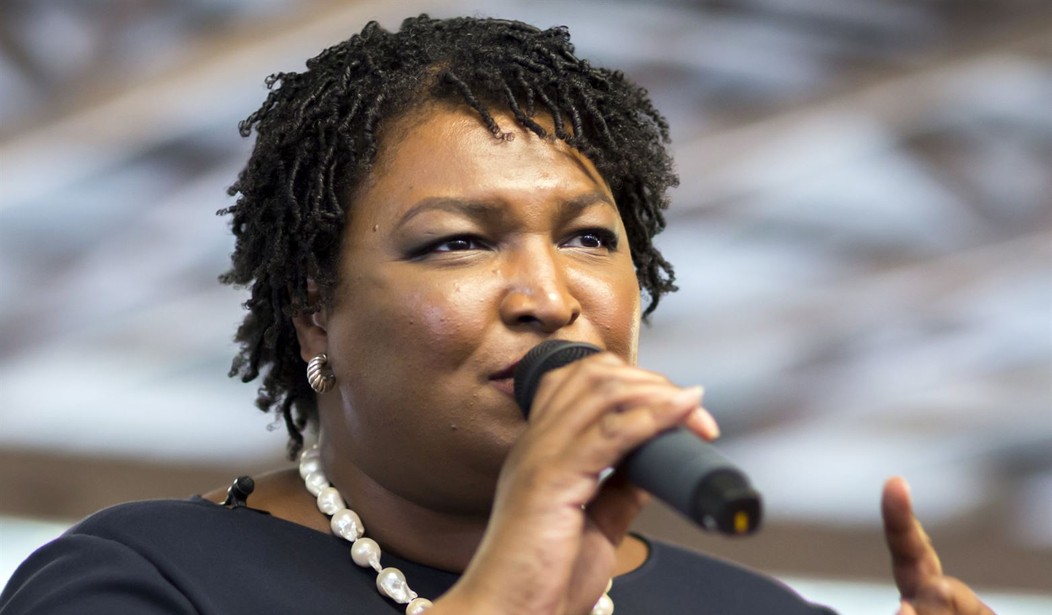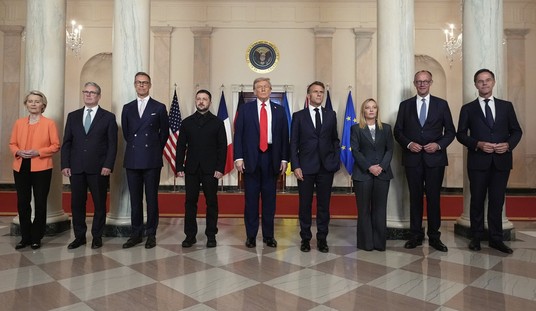Via Fox News, Republican strategist Matt Whitlock made quite a catch with this a few days ago.
I’ve never heard of an op-ed being “updated” or otherwise revised days after it was originally published unless there was an error of fact in the first version. A newspaper has an obligation not to mislead its readers; if an op-ed does that then it’s appropriate to correct the record by reworking the piece after it’s gone live. (Along with a note indicating what happened.) But I’m unaware of any editorial standard by which an author is allowed to rewrite parts after the fact to make the text less politically troublesome for him or her. A regrettable opinion isn’t a factual error. “Updating” a piece to save face is nothing more or less than trying to hide the evidence of one’s earlier opinion lest it embarrass the writer or cause trouble for them somehow.
Whitlock noticed that the cached version of Abrams’s March 31 op-ed in USA Today about Georgia’s new voting law contained lines that don’t appear in the live version currently accessible online. In particular, this paragraph in the original version was changed:
The impassioned response to the racist, classist bill that is now the law of Georgia is to boycott in order to achieve change. Events hosted by major league baseball, world class soccer, college sports and dozens of Hollywood films hang in the balance. At the same time, activists urge Georgians to swear off of hometown products to express our outrage. Until we hear clear, unequivocal statements that show Georgia-based companies get what’s at stake, I can’t argue with an individual’s choice to opt for their competition.
Abrams did go on to say that she didn’t believe boycotts were necessary — “yet,” a hint that they might be eventually. In the current version of the op-ed, which was reworked a few days after MLB yanked the All-Star Game from Georgia, the line in which she blesses individual boycotts of companies has mysteriously disappeared. There’s also no reference left in the body of the text about boycotts not being needed “yet.” The column does still have a section break with that title but Abrams’s actual words have been removed.
And there was another change. New language warning about the human costs of boycotts was added to the updated op-ed:
Boycotts invariably also cost jobs. To be sustainable, the pain of deprivation must be shared rather than borne by those who are least resilient. They also require a long-term commitment to action. The North Carolina boycott of 2016 didn’t stop with the election of Democrat Roy Cooper, and the venerable Montgomery Bus Boycott lasted 381 days, ending only with a Supreme Court decision.
The boldfaced line wasn’t in the original.
So here’s a theory. On March 31, when the piece was initially published, Abrams assumed that MLB wouldn’t end up pulling the All-Star Game. Indeed, there are reports that she was quietly urging the league not to leave Georgia, likely fearing that she and her progressive allies would be blamed by local businesses for driving away a cash cow with their agitation against the state’s new voting law. Believing that the game would take place as scheduled, Abrams felt it was safe to take a, shall we say, “boycott-curious” line in her op-ed. What was the harm? Baseball wasn’t going anywhere. She could show off her social conscience without risking any economic repercussions.
But then the league surprised her by moving the game anyway, probably because of public pressure it felt after Joe Biden endorsed the idea. Suddenly Abrams was exposed, having just gone on record as saying she couldn’t fault a consumer who chose not to patronize a business that refused to criticize Georgia’s law. That made it sound like she was open to small-scale economic warfare on businesses in her home state and might be open to large-scale economic pressure later via an organized boycott.
Which is a bad look for a would-be governor eyeing a run in 2022. If other businesses followed MLB’s lead and started pulling out of the state, she’d be left holding the bag for the economic fallout. So she or her team scrambled to rewrite the USA Today op-ed, dropping the line about individual boycotts and adding some language about the steep price potentially in jobs. She was no longer boycott-neutral. She was anti-boycott. It was political spin by a once and former candidate aimed at protecting her electoral viability.
And it was done with the complicity of USA Today, which allowed her to change the op-ed for reasons that escape me. They didn’t even add an editor’s note acknowledging the changes until Whitlock and others started making noise about it:
And yet, as this 4/21 archive shows, the editor’s note was not present. It appears the op-ed was revised on April 6th, but an editor’s note about the change was only added within the past 2 days:https://t.co/JLR1YWTeDd pic.twitter.com/bqpxOmIBjK
— Jeryl Bier (@JerylBier) April 23, 2021
Fox asked the paper about the stealth edits and received this non-answer:
UPDATE: Gannett spox issued a statement:
"We regret the oversight in updating the Stacey Abrams column. As soon as we recognized there was no editor’s note, we added it to the page to reflect her changes. We have reviewed our procedures to ensure this does not occur again." https://t.co/WKEUo38prO
— Joseph A. Wulfsohn (@JosephWulfsohn) April 27, 2021
Adding the editor’s note belatedly is bad but it’s a venial sin. The mortal sin was allowing Abrams to edit the piece after it had been published, for what appears to be purely self-serving political reasons. She thought the original version seemed too soft on boycotts after MLB pulled the game from Atlanta so she asked USA Today if she could clean it up to protect herself. And they said yes.
Why? Just doin’ Stacey Abrams a favor because they agree with her politics? Have any other progressives gotten the same after-the-fact whitewashing privileges from Gannett?
I’ll leave you with this news, evidence that a right-wing backlash against baseball since the league boycotted Georgia either isn’t happening or is being overtaken by a surge in interest from other parts of the population. Not only are cable TV ratings on Sunday night up, the league claimed last week that streaming of baseball online has risen 43 percent since the same period in 2019. Maybe post-pandemic America is hungry for sports again.
"Sunday Night Baseball" is off to its best start since 2017 (when Cubs-Cards started the season with a boffo number just after the Cubs' World Series win).
This season (four games) is +26% from late start in 2020. +23% from 2019 start. pic.twitter.com/swxPw77YH6
— Austin Karp (@AustinKarp) April 27, 2021









Join the conversation as a VIP Member